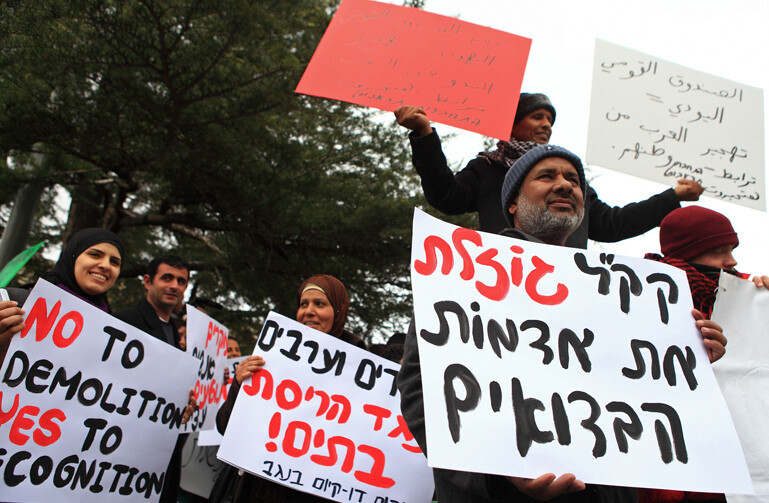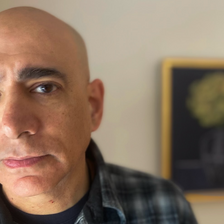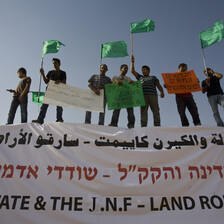The Electronic Intifada London 31 May 2011

Bedouins carrying signs reading “JNF robs Bedouin land” protest in front of the Jewish National Fund office in Jerusalem, 1 February 2011.
ActiveStillsA spokesperson for David Cameron on Friday refused to comment on the rationale behind the British prime minister’s decision to step down from his position as honorary patron of the Jewish National Fund (JNF). The move comes as pressure on the JNF steps up in Britain, and is being hailed by activists as a big victory in the boycott, divestment and sanctions (BDS) campaign.
Campaigners with activist group Stop the JNF had written to Cameron earlier in May calling on him to cut his links with the JNF. Registered as a charity in the UK, the JNF is involved in development of illegal settlements in the Israeli-occupied West Bank, the destruction of Palestinian Bedouin villages in the Naqab (Negev) inside Israel and stands accused of institutionally racist practices and complicity in ethnic cleansing since 1948.
Cameron’s press office told The Electronic Intifada that the decision had been made after a review of all the charities Cameron supported: “This is not a particularly recent decision,” said a spokesperson on Friday. In a short statement Thursday, the prime minister’s office had said the JNF was one of a “number of charities” Cameron stood down from following the review which was undertaken “[f]ollowing the formation of the Coalition Government last year.”
The statement did not specify any reason for the move. When asked if it was related to the JNF’s involvement with Israeli settlements in the West Bank (which the British government, in line with international law, considers illegal) the spokesperson said they were “not going to get into any further details.”
The spokesperson implied that Cameron is only involved in local causes: “The charities that he’s currently involved with will normally be charities in his [local parliamentary] constituency … or a couple of national campaigns. There aren’t really any that deal with specific issues in specific foreign countries,” he stated. He would not comment on why this had changed after Cameron had become prime minister.
The JNF’s UK office refused to comment on the matter. A report in The Jewish Chronicle on Thursday suggested “time constraints” were behind the move, although the email statement did not mention this (“Cameron leaves the JNF,” The Jewish Chronicle, 26 May 2011). On the Spectator website Monday, staunchly Zionist columnist Melanie Phillips used her blog to describe the move as “the latest act of aggression against Israel by HMG [Her Majesty’s Government],” and suggested that the time constraints justification are “unconvincing” (“Cameron drinks the Kool-aid,” Spectator blogs, 30 May).
The spokesperson refused to name the other groups, saying he didn’t “think it would be very fair on the other charities that he stepped down from to name them.” While the statement claimed a “full list of all the charities and organizations the prime minister and Mrs. Cameron are associated with is published on the Cabinet Office website,” several searches for this list were unsuccessful. The spokesperson declined to provide The Electronic Intifada with a link to the list.
According to a list on the JNF’s UK website, the move leaves former Prime Minister Gordon Brown as the only serving member of parliament left as honorary patron to the group. Other figures on the list include staunch supporters of Israel such as former prime minister and current Quartet envoy Tony Blair and Israeli government figures such as Shimon Peres. An open letter signed by campaigners calling for current Labour leader Ed Milliband to “break from this tradition” of party leaders patronizing the JNF was printed by The Guardian in October. So far he has not followed Brown, Blair or Cameron (who became patron while opposition leader).
The JNF is a quasi-governmental organization that controls large swathes of state land in Israel. This land is reserved for the use of Jews only — to the detriment of Israel’s 1.5 million Palestinian citizens, and the hundreds of thousands of Palestinians who were expelled from that land by Zionist militias in 1947-48.
The JNF has in recent years tried to re-brand itself as an environmentally-friendly charity, an effort critics have branded “greenwashing.” But pressure on the JNF mounted Saturday as Friends of the Earth (FoE) Scotland, at its annual general meeting, voted to endorse the Stop The JNF campaign. Chief Executive Stan Blackley said FoE Scotland was “pleased” to join the call for revocation of the JNF’s charitable status, according to a Scottish Palestine Solidarity Campaign (SPSC) press release (“Friends of the Earth Scotland endorses call …,” Stop the JNF website, 28 May).
The JNF has been connected with ethnic cleansing and abuse of Palestinian rights on both sides of the green line — the internationally-recognized armistice line between Israel and the occupied West Bank.
Journalist Max Blumenthal reported that the fund recently “set its sights” on al-Araqib in the Naqab (or Negev) desert. The Bedouin village has been destroyed 21 times since July 2010 so that the JNF can “develop” the area as part of the government’s Judaization campaign (“On Land Day, the Jewish National Fund’s Racist Legacy is Exposed,” MaxBlumenthal.com, 30 March 2011). The JNF is also involved in funding projects in illegal West Bank colonies such as Sansana in the south Hebron hills.
According to Adalah, the Legal Center for Arab Minority Rights in Israel, as of 2007 the JNF owned a total of just over 2.5 million dunams of land (a dunam is the equivalent of 1,000 square meters), the majority of which was seized from Palestinian refugees.
In the course of a 2004 legal challenge by Adalah, the JNF confirmed in a response to the court its discriminatory policies against non-Jews: “The JNF is not the trustee of the general public in Israel. Its loyalty is given to the Jewish people in the Diaspora and in the state of Israel … The JNF… does not have a duty to practice equality towards all citizens of the state” (“Land Controlled by Jewish National Fund for Jews Only,” Adalah press release, 29 July 2007).
Stop the JNF, which emerged in May of last year, is a working coalition of different campaigning groups including the Scottish Palestine Solidarity Campaign, the International Jewish Anti-Zionist Network and the Palestinian BDS National Committee (BNC). The campaign will be holding a series of workshops in London on 4 June.
Asa Winstanley is a freelance journalist based in London who has lived in and reported from occupied Palestine. He is the editor of a book about the Russell Tribunal on Palestine coming out on Pluto Press later in 2011. His website is www.winstanleys.org.




